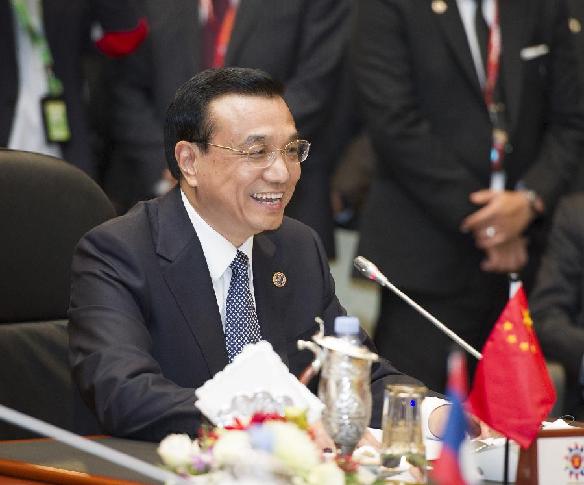Li Keqiang seeks ties with Southeast Asia through trade
- By Sajjad Malik
 0 Comment(s)
0 Comment(s) Print
Print E-mail China.org.cn, October 12, 2013
E-mail China.org.cn, October 12, 2013
Chinese Premier Li Keqiang landed in Brunei on Wednesday on a week-long trip to Southeast Asia - his first regional visit since assuming the premiership in March. During this important trip, the Chinese leader attended important forums like the China-ASEAN leaders' meeting and the eighth East Asia summit, and interacted with several world leaders. The itinerary, which includes formal visits to Brunei, Thailand and Vietnam, is in progress, but some of the key meetings have already taken place, including meetings with the Bruneian leaders.
|
|
|
Chinese Premier Li Keqiang attends the 16th China-ASEAN leaders' meeting in Bandar Seri Begawan, Brunei, Oct. 9, 2013. [Huang Jingwen/Xinhua] |
The crux of the visit is to give a push to China's goals of developing closer links with all neighbours to build economic bridges to promote bilateral economic relations with the regional countries through cooperative partnerships. Premier Li set the tone of the engagements in his talks with the energy rich Bruneian leaders, when he termed his host country a "nation of peace." He said that with deepened political mutual trust and remarkable achievements in economic, trade and energy cooperation, China and Brunei have maintained good communication on global and regional issues. It was evident that the Chinese leader was looking for better communication with all other regional nations, like it had with Brunei.
One of the key engagements of Premier Li was the China-ASEAN meeting, where he got the chance to listen the regional leaders and express his honest feelings. In his keynote address the Premier said: "If I could compare China-ASEAN cooperation to a fine piece of silk, then China and ASEAN would be the vertical thread and horizontal thread on the loom that have to be interwoven by the shuttle of mutual trust." The poetic imagery was not lost on the leaders, most of them were eager to deepen ties with China. He also gave a seven-point road map for regional development and progress. He highlighted the ten years of partnership but emphasized that strategic cooperation was needed for better economic ties.






